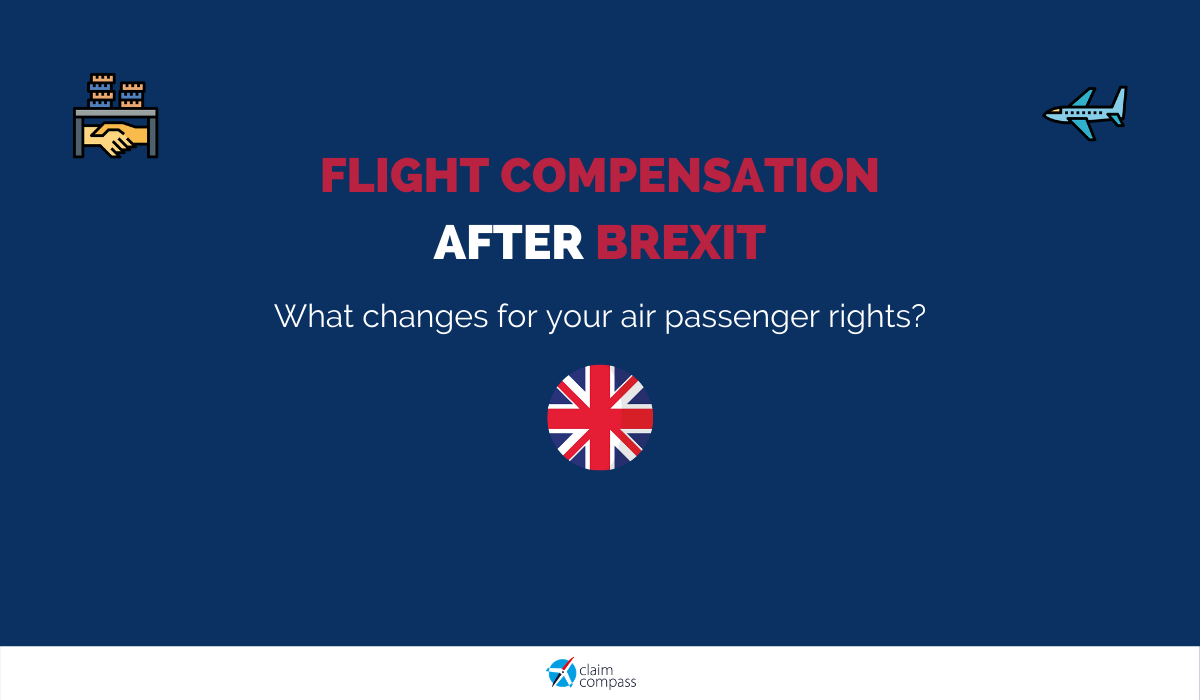Flight Compensation: How Brexit Affects your Passenger Rights
What is the state of air passenger rights and flight compensations after Brexit? Here's what changed - and what didn't.

After a long, drawn out period of umming and ahhing, the United Kingdom finally left the European Union at 11pm on 31 January 2020.
This was a pivotal moment in history which has launched Great Britain and Northern Ireland into an uncertain future. Many questions about trade and travel remain unanswered.
Its effect will be multi-faceted, and will impact the way that we travel. Passenger rights after Brexit for example is something many people are worried about, and understandably so.
Between questions about flight compensation after Brexit and travel insurance, passengers are concerned.
Read on to discover where you stand post-brexit and learn more about UK law, the transition period and the withdrawal act. We’ll make sure you don't get lost in all the confusion.
Your passenger rights under the EU Regulation 261/2004
EC261 was brought into action way back in 2005. It was created to make sure passenger rights were protected in the event of an airline slip up. Ultimately, it ensures that airlines pay up compensation when travellers are eligible.
There are lots of different components that constitute this comprehensive piece of legislation. We’ll walk through that now...
When is EU261 applicable?
The EU261 regulation is applicable to a number of situations. Passengers must fulfil the following criteria to be covered by EU law:
Their flight departed in an EU country or landed in an EU country and they flew with an EU airline
The flight disruption was not a result of extraordinary circumstances
Regulation EC outlines extraordinary circumstances as situations the airline could not control. Some of these situations include:
Air traffic control restrictions
With a whopping 4.3 billion people travelling by plane every year, it’s not surprising that there’s often a lot of traffic up in the clouds.
Because of this, airlines must take precautions to ensure the safety of their passengers. This includes airlines changing their flight routes, or delaying take off.
Bird strikes
Collisions with birds actually happen more often than you’d think. Although they usually cause little damage to the plane, there are procedures that must be followed to ensure damage is minimal. This means your trip to see Jungfrau and Chillon castle in Switzerland may be delayed.
Bad weather conditions
When it comes to bad weather conditions, national regulatory bodies usually outline what counts. In the UK this is the Civil Aviation Authority (CAA) while in the US this is the Federal Aviation Authority (FAA).
Some of these weather conditions may include blizzards, storms, or snow.
Political instability
Political instability is not something airlines have any control over. So protests or violent demonstrations are not covered by EU261.
For advice on what to do when faced with delays due to political instability, check out this article.
Strikes
As with any industry, airline and airport staff may choose to strike. This typically comes without warning, and is used as leverage to improve working conditions or to secure better pay.
Whatever the reason, if this causes delays or cancellations according to EU rules, the airline does not have to pay compensation.
However there are a few exceptions you should watch out for, such as wildcat strikes.
Security risks
While this is pretty rare, the airline may have to delay or cancel a flight due to a criminal being on board, or passengers causing disturbances.
Technical issues and mechanical faults with the plane DO NOT fall under this bracket. So, EU261 is still applicable if the airline finds a problem with the engine fan blades, or discover there’s been a contamination of the aircraft’s fuel.
To discover more reasons why your flight may be delayed, head over to our blog.
Right to compensation for flight delays, cancellations, and overbooking
When it comes to your right to claim compensation, the EC261 regulation varies. It will be subject to change depending on whether your flight was delayed, cancelled or overbooked. As does the amount you’re entitled to.
To be eligible for flight delay compensation, in addition to the rules outlined above, your flight must have been delayed by 3 or more hours.
The compensation amount that you are entitled to is determined by the distance of the flight.
And, there’s more good news. In addition to your compensation claim, if your flight leaves the airport 5 hours after it was meant to, you can apply for a refund too!
So, say your British Airways flight from Norway to the UK was delayed by 5 hours or more you can secure a full refund. And, if you touched down in the UK 3 hours after you were meant to, you’ll get your hands on some compensation too!
In association with this, if your delayed flight with an airline causes you to miss your connecting flight, don’t sweat it EU261 covers this too. This scenario could mean you are entitled to missed connection compensation.
But, bear in mind you must have booked both flights under the same booking number or PNR.
As for flight cancellations, EU261 means that you can either get a refund, or be rerouted on a rebooked on a flight.
To qualify for compensation, you need to have been informed less than 14 days in advance. And if you accept a rebooking, you must arrive at your intended destination 2 hours or more after the original flight.
The compensation amount you are entitled for a cancelled flight is determined by a number of factors. This includes the length of your flight, how long you were delayed by and how much notice you were given.
To get the full rundown of cancellation compensation amount, check out our blog.
Any disruption to air travel is annoying. Be it a delayed flight or rerouting due to cancellation, overbooking really takes the biscuit.
As much as it may frustrate us, overbooked flights do happen, although some airlines are more likely to bump passengers than others.
If you do get bumped, EU261 protects your right to compensation and care. However once again to be eligible you must fulfil a particular criteria.
Your obstruction must have been due to overbooking, and you must have turned up on-time for check-in. You must also not have given up your seat voluntarily, or accepted alternative compensation from the airline.
Stick to these rules and the airline, whether Ryanair or EasyJet, must pay up.
When you’re denied boarding, and forced to stay in the airport for 2 hours or more, airlines also have a duty of care. This means they should provide food, accommodation and some form of communication.
Passenger Rights after Brexit: How does the UK out of the EU affect my air passenger rights?
Now that the UK is no longer an EU member, you may be wondering if the same rules apply. Well, it isn’t a simple yes or no answer. We delve into the details below.
Is EU261 still applicable in the UK after Brexit?
Considering EU261 is pretty extensive in its protection of passenger rights, you may be worried that you’re no longer covered. Well, fear not.
Luckily, a withdrawal agreement in the form of the 2018 EU Withdrawal Bill was formed and agreed to by both the EU and the UK. This means that many existing pieces of EU legislation, including EU261, were enshrined into domestic law by the UK government.
This means passenger rights after Brexit will stay the same, even if you are flying from non-EU countries, to an EU airport on UK airlines.
The legislation made sure to fill in any gaps in the wake of Brexit. The UK law now covers:
- Any flight that leaves the UK regardless of the airline
- All flights that take off outside of the UK and touch down in the UK and the airline is registered as EU or UK
- All flights that take off outside of the UK and touch down in the EU and the airline is registered as a UK carrier
However, there are a few changes that accompany Brexit. Passengers with a European Health Insurance Card (EHIC) will no longer be able to use it in the UK after January 1 2021.
When can you claim a flight compensation after Brexit?
The UK entered the transition period (otherwise known as the implementation period) on 31 January, which is expected to last for a year. Within this period, your right to claim compensation stays exactly the same as it was prior to Brexit.
So, rest assured, you can still secure flight compensation after Brexit.
However, this regulation is no longer protected by EU law. This means in the future the UK government could make changes to the law affecting how passengers claim flight compensation.
Are airlines affected by Brexit?
Post-Brexit, much will stay the same for airlines, up until the end of 2020. Traffic rights for both UK and EU airlines in the European Common Aviation Area will remain unchanged..
Within this period, the UK will also remain a member of the European Aviation Safety Agency (EASA). This means that airlines will still have to comply with the same safety regulations as before and have the same accessibility.
After the transition period, airlines with UK licenses won’t have the same accessibility to the single EU aviation market. This means that they will have to renegotiate their rights to fly to, from and in the EU.
The same applies for EU airlines entering the UK.
While some bilateral agreements have already been made between the UK and US, there is still a lot to be done.
Brexit has had many financial implications on all sectors including the aviation industry. Upon its announcement, Brexit had a huge impact on the shares of UK registered airlines. On average they lost 33% share value.
However, some airlines were unable to survive such a period of uncertainty. West Midlands-based airline Flybmi for example blamed Brexit for forcing it into administration.
A few final thoughts on Brexit, flight compensations, and air passenger rights
Brexit has launched the UK into a precarious situation, both economically and politically. However, passenger rights after Brexit will stay relatively the same, for the time being.
Although the UK is no longer an EU member state, the Withdrawal Bill means your right to claim flight compensation after Brexit is untouched.
Even in the event of a no-deal Brexit at the end of 2020 or at the latest 2022, which is looking more and more likely, this will remain the same.
Within the next year, passengers can use the same passport and line up in the same passport queue. They will also not need any additional paperwork or visa.
From 2021 and onwards, things will be a little different. After the transition period, travellers will either need to acquire different documents. This will either be the European Travel Information and Authorisation Scheme (ETIAS) or the Schengen Visa.
